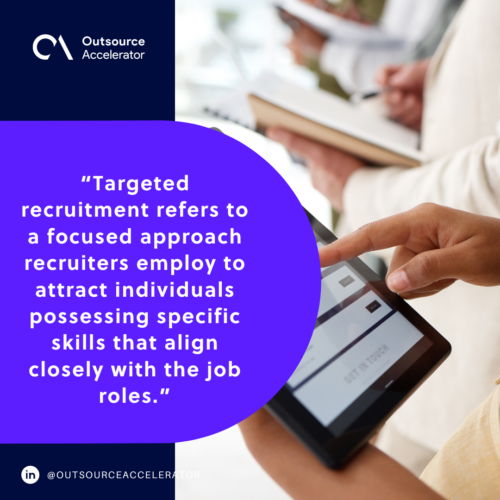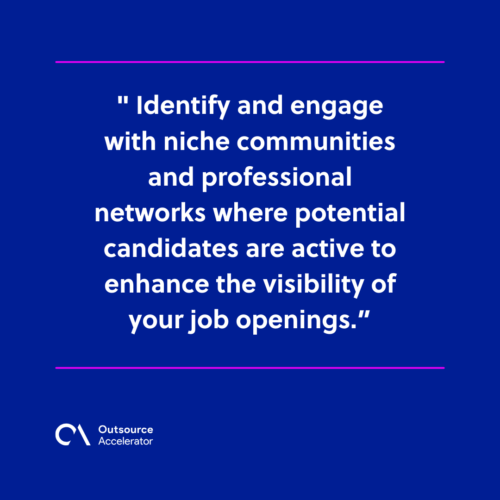What is targeted recruitment?

Building a successful business hinges on having the right team by your side. An effective recruitment team is essential to assemble the ideal blend of skills supporting your business’s growth.
Traditionally, the human resource department has shouldered the hiring process. However, as trends shift and business landscapes continually evolve, so does the approach to the hiring process.
Today, numerous companies are adopting a new recruitment strategy known as targeted recruitment, and this article will delve into its significance.
Defining targeted recruitment
Targeted recruitment refers to a focused approach recruiters employ to attract individuals possessing specific skills that align closely with the job roles.
This recruitment strategy aims to identify and appeal to select candidates who precisely match the company’s desired criteria.

Targeted recruitment vs. Open recruitment
Open recruitment typically seeks to attract a wide array of applicants, casting a broad net to generate a large pool of potential candidates.
In contrast, targeted recruitment takes a more focused route by honing in on particular demographics, specialized skill sets, or often underrepresented groups within the talent pool.
Rather than accumulating numerous applications like open recruitment, this method prioritizes a refined and personalized hiring process.
In other words, targeted recruitment yields hires that are not just plentiful but also better suited and more aligned with the company’s objectives and values.
Benefits of targeted recruitment
Let’s explore the benefits of targeted recruitment:
Efficient recruitment process
Targeted recruitment optimizes efficiency by concentrating efforts on candidates with the desired qualifications, skills, and experiences.
Consequently, it translates into tangible benefits such as:
- Reduced time-to-fill positions
- Decreased recruitment costs
- Quicker onboarding of new talent
Refined selection process
Targeted recruitment not only delves into the technical qualifications but also the cultural fit. This leads to improved employee retention rates as individuals hired through this approach resonate with the company’s ethos.
Targeted underrepresented groups
Organizations foster a more inclusive environment by purposefully directing recruitment efforts toward underrepresented groups.
Targeted recruitment promotes diversity, bringing individuals from varied backgrounds, cultures, and perspectives into the fold.
According to Our Great Place To Work, diverse teams drive organizational innovation, leading to a richer tapestry of ideas and solutions.

Enhanced employer branding
When an organization prioritizes targeted recruitment, it inherently showcases its commitment to valuing specific skill sets and embracing diversity in backgrounds.
This intentional emphasis doesn’t just streamline the hiring process; it significantly augments the employer’s brand image.
The company is dedicated to fostering an inclusive and diverse workplace culture by highlighting these core values. This, in turn, positions the organization as an attractive destination for top-tier talent seeking alignment with such values.
Tips to create a targeted recruitment strategy
Below, we explore actionable tips that organizations can employ to craft an impactful, targeted recruitment strategy:
Understand your target audience
It’s crucial to undertake comprehensive research first to attract the right talent effectively.
This involves delving deep into identifying the specific demographics, essential skills, and varied experiences that align with your organization’s needs.
Understanding these aspects can help you craft tailored recruitment strategies that resonate with your desired candidate profile.
Highlight what makes your firm attractive
Emphasize your organization’s distinct selling points to capture potential candidates’ attention. This includes spotlighting tangible benefits and intangible elements such as company culture, values, and career growth prospects.
By articulating these aspects, you can pique the interest of qualified candidates and entice them to consider your organization an appealing career destination.
Post job openings on trending job boards
Utilize specialized job boards and platforms that resonate with your target audience. Identify and engage with niche communities and professional networks where potential candidates are active to enhance the visibility of your job openings.
By strategically posting on trending job boards relevant to your industry or the specific skills you seek, you increase the likelihood of attracting qualified and culturally fit individuals.

Some job boards that are predicted to continue to trend in 2024 are:
- Indeed
- GoogleForJobs
- Monster
- Jora
Or you can also look for your target talents on these social media as they are the avenue for finding Gen Z applicants:
- Tiktok
Engaging with these platforms helps expand your reach and draw in candidates who align closely with your recruitment objectives.
Ensure inclusivity in your recruitment
Address biases by actively identifying and eliminating them from the recruitment process.
Implement using inclusive language in job descriptions. It ensures that the wording doesn’t inadvertently discourage or exclude certain groups.
Moreover, fostering an inclusive environment involves embracing diversity as a core value. It’s about creating a workplace culture that appreciates and celebrates differences among candidates.
Doing so makes every candidate feel valued and respected throughout the recruitment process, irrespective of their background.
Securing talent through targeted recruitment
Organizations can secure top-tier talent by tailoring recruitment efforts to target individuals who align with the company’s values and objectives.
This strategic alignment ensures a better fit within the company culture and sets the stage for sustained success and growth in the long term.
Ultimately, targeted recruitment isn’t just about filling positions—it’s about laying a sturdy foundation for continued prosperity among employees and employers.







 Independent
Independent




